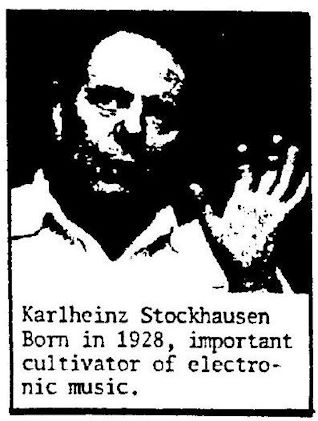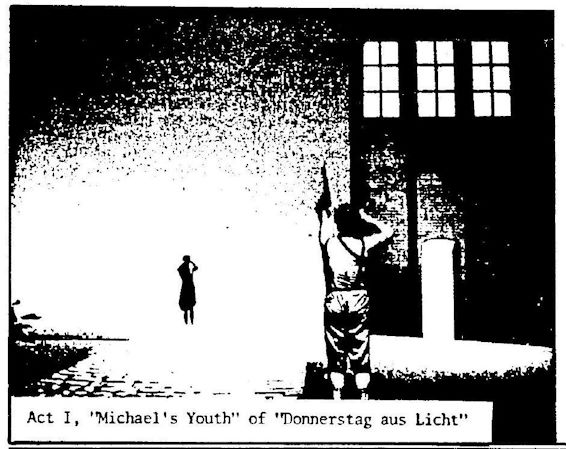© 1988 Madeline Noordzy
© 1988 ANZURA, Australia & New Zealand Urantia Association
It was to be expected that like Homer’s and Shakespeare’s great literary works before, sooner or later The URANTIA Book would become the inspiration for a major musical composition.

Round about 1975 the German composer Stockhausen announced that he would embark upon an opera cycle, which would be called “Licht” (light) and when complete would be designed to be performed on seven consecutive evenings. One might have thought that the plan was to begin with the first day’s opera and proceed sequentially to the grand finale. But it soon became obvious that this was not the case. There is a thread of continuity linking each work to the next, but Stockhausen composed them piecemeal, an act, sometimes a scene, at a time. Each complete part is named after a day of the week and in 1985 two days were complete: “Donnerstag” (Thursday) being produced at Covent Garden and “Samstag” (Saturday) first staged in 1984 in Milan. The first part of “Licht” however to be performed, was a part of “Dienstag” (Tuesday) and was called Der “Jahreslauf” (The course of the Years). This hour-long work was first performed in 1977.
It was just by mere chance that one of the members of the Melbourne URANTIA Book study group, Ina, found a September 1985 issue of the English publication “OPERA”. Ina works for The Victorian State Opera and one day went through an old pile of magazines ready to be disposed of. What first caught her eye was a picture of the stage setting for Act 2 of “Donnerstag”: “Michael’s Journey Around The Earth”. The big earth globe was rather striking, she thought.


As she read the article, written by Andrew Clements, all of a sudden she sat up straight. She read (and I quote from Clements’ article) 'Michael’s childhood has obvious parallels with the composer’s own unhappy early life during World War II and into it are woven characters from The URANTIA Book, a piece of occult arcanum that places Satan above God as the supreme ruler of our universe and which in part seems to have replaced orthodox religion (first Roman Catholicism, later Sufism) in Stockhausen’s life. Eve, Lucifer and the Archangel Michael are the main characters in “Donnerstag” and they stem directly from this curious source."
It is obvious that Clements has never laid eyes on The URANTIA Book and he should have stuck to what he was paid to do: Write a critique on the music of Stockhausen, which he does in a very positive way. He writes: “What remains irrefutable, however, is Stockhausen’s ability to compose music of breathtaking brilliance and originality, even if such a gift visits him only irregularly.”
What is important here, however, is the fact that The URANTIA Book was the source of inspiration for this composer, who, by the way, in the 1950 's belonged to a group of avant garde composers who felt that opera houses should be blown up. Opera had no relevance in this day and age, they thought. Stockhausen “must have mellowed and “Licht” is the result.
Clements writes: “Stockhausen has constructed a curious amalgam of autobiography and mysticism, there can be no doubt that in the character of Michael, played in the opera by a tenor, a dancer, and a trumpeter, there is a good deal of the young Karlheinz, a character who, one should note, ends the opera as a kind of angel ‘to bring celestial music to humans and human music to the celestial beings, so that Man may listen to God and God may hear his children’.”
I hope to see this opera some day. In the meantime…I wonder if we should send Andrew Clements a copy of The URANTIA Book and ask him if the opera was ever finished.
Madeline Noordzy, Melbourne